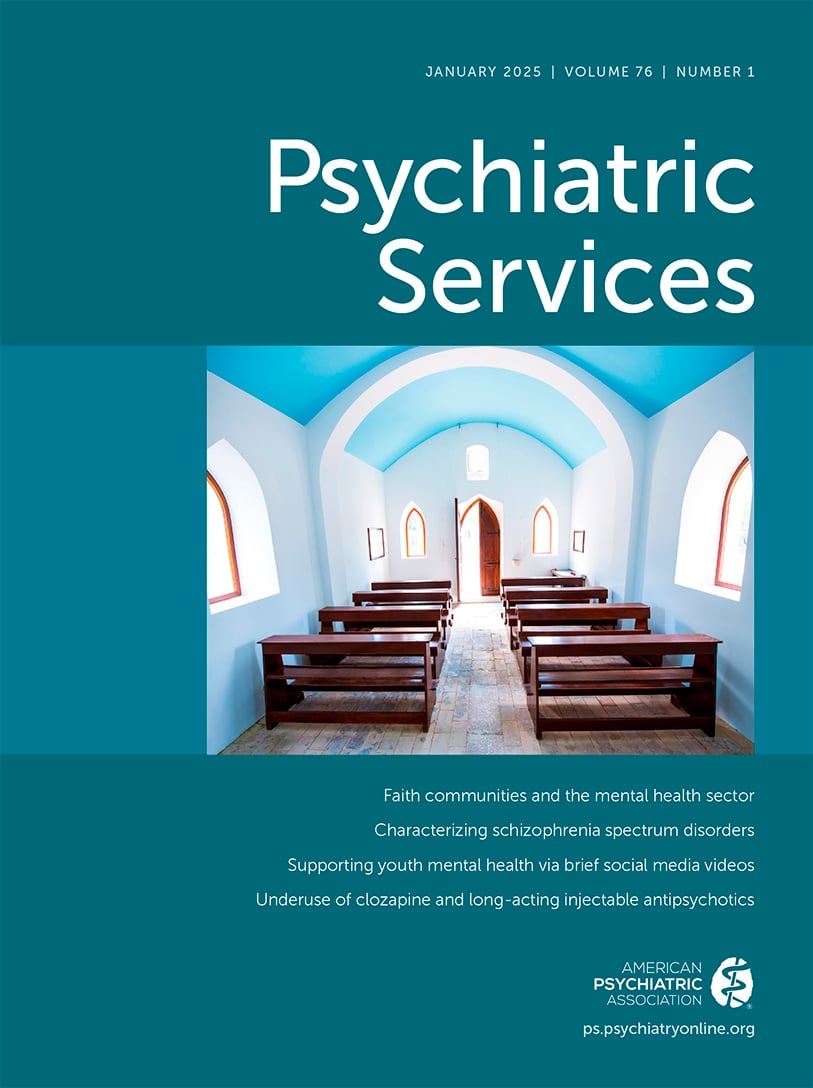Psychiatric Services
- Volume 75
- Number 2
- February 2024
Taking Issue
Articles
Publication date: 11 October 2023
Pages108–114Objective: This study aimed to examine population-level disruption in psychotherapy before and after the rapid shift to virtual mental health care induced by the onset of the COVID-19 pandemic in the United States. Methods: This retrospective study used ...
https://doi.org/10.1176/appi.ps.20230181Publication date: 27 September 2023
Pages115–123Objective: This study quantified the prevalence of postpartum mood and anxiety disorder (PMAD) diagnoses among symptomatic Michigan Medicaid enrollees and explored factors associated with receiving a diagnosis. Methods: Data sources comprised Michigan ...
https://doi.org/10.1176/appi.ps.20230094Publication date: 09 August 2023
Pages124–130Objective: Suicide remains an urgent public health crisis. Although some sociodemographic characteristics are associated with greater suicide risk in the general population, it is unclear whether individuals utilizing health care in the United States have ...
https://doi.org/10.1176/appi.ps.20220578Publication date: 09 August 2023
Pages131–138Objective: The purpose of this study was to test the effects of causal explanations, information about treatability, and type of psychiatric diagnosis on how the public reacts to an individual described as having a specific mental illness versus ...
https://doi.org/10.1176/appi.ps.20230169Publication date: 17 August 2023
Pages139–147Objective: The authors aimed to use health records data to examine how the accuracy of statistical models predicting self-harm or suicide changed between 2015 and 2019, as health systems implemented suicide prevention programs. Methods: Data from four large ...
https://doi.org/10.1176/appi.ps.20230172Publication date: 09 August 2023
Pages148–154Objective: In July 2022, the 988 Suicide and Crisis Lifeline went live. The Lifeline is part of larger federal and state efforts to build comprehensive behavioral health crisis response systems that include mobile crisis units and crisis diversion and ...
https://doi.org/10.1176/appi.ps.20220628Publication date: 02 August 2023
Pages155–160Objective: Although coordinated specialty care (CSC) is an effective service model to address first-episode psychosis, CSC is not widely accessible in the United States, and funding for this service model often remains challenging. The authors examined ...
https://doi.org/10.1176/appi.ps.20220112Publication date: 09 August 2023
Pages161–166Objective: Programs for early detection of psychosis help identify individuals experiencing emerging psychosis and link them with appropriate services, thereby reducing the duration of untreated psychosis (DUP). The authors used the cascade-of-care ...
https://doi.org/10.1176/appi.ps.20230005Global Mental Health Implementation Science Protocol
Publication date: 31 October 2023
Pages167–177Background: Task sharing may involve training nonspecialist health workers (NSHWs) to deliver brief mental health interventions. This approach is promising for reducing the global mental health treatment gap. However, capacity is limited for training large ...
https://doi.org/10.1176/appi.ps.202100223Brief Reports
Publication date: 09 August 2023
Pages178–181Objective: The authors aimed to assess differences in appointment completion rates between telepsychiatry and in-person outpatient psychiatric care for patients with depression in an academic health system. Methods: Electronic health records of encounters ...
https://doi.org/10.1176/appi.ps.20230064Publication date: 24 August 2023
Pages182–185Objective: This report aimed to assess how accountable care organizations (ACOs) addressed ongoing opioid use disorder treatment needs over time. Methods: Responses from the 2018 (N=308 organizations) and 2022 (N=276) National Survey of Accountable Care ...
https://doi.org/10.1176/appi.ps.20230087Publication date: 02 August 2023
Pages186–190Objective: This study aimed to examine differences in community mental health visit notes before and after initiation of collaborative documentation, a practice in which clinicians and consumers jointly document clinical encounters. Methods: Using a clinical ...
https://doi.org/10.1176/appi.ps.20230118Open Forum
Publication date: 21 September 2023
Pages191–193Intermediary and purveyor organizations play a key role in disseminating and implementing evidence-based behavioral health best practices (EBPs). The authors provide a case example to describe how state-funded intermediaries can enhance the implementation ...
https://doi.org/10.1176/appi.ps.20230139Economic Grand Rounds
Publication date: 07 September 2023
Pages194–197More than $100 billion in Coronavirus Aid, Relief, and Economic Security (CARES) Act funding was intended to support financially stressed health care providers during the COVID-19 pandemic. The distribution of the CARES Act’s Provider Relief Fund among ...
https://doi.org/10.1176/appi.ps.20230040Technology in Mental Health
Publication date: 09 August 2023
Pages198–201Refugee populations face disproportionately high risk for mental health challenges because of their exposure to geopolitical conflict, persecution, violence, and human rights violations. Dedicated, sustained psychological services are scarce in refugee ...
https://doi.org/10.1176/appi.ps.20230179Past Issues
View Issues Archive
Vol. 76 | No. 1

Vol. 75 | No. 12

Vol. 75 | No. 11
